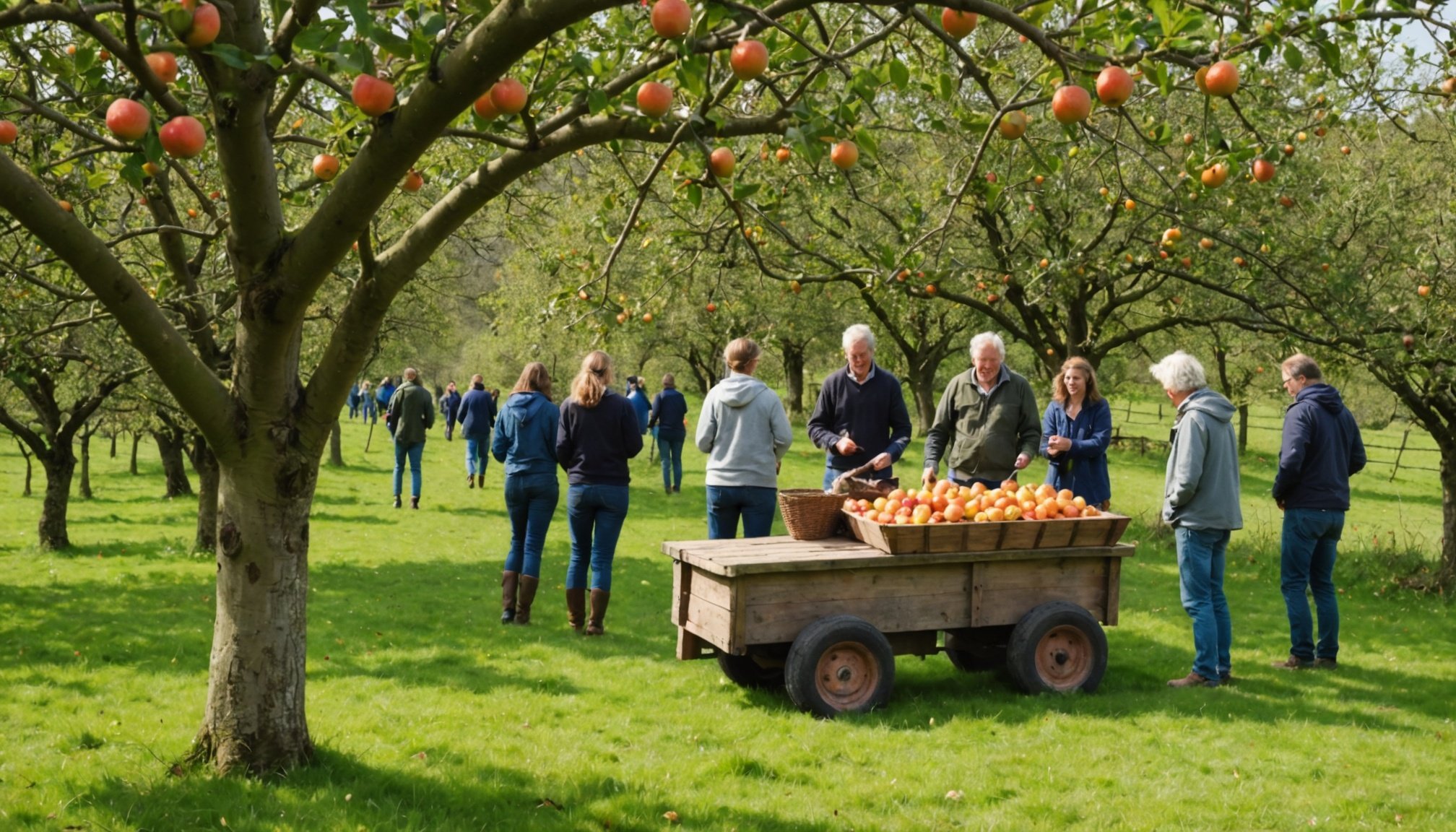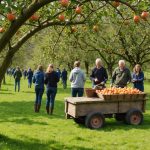Overview of Cider-Making in Somerset
Cider-making in Somerset boasts a rich history that intertwines deeply with the region’s cultural roots. Tracing back several centuries, cider became an integral part of both the economy and daily life. Its evolution reflects the resilience and adaptability of the local community, which admittedly has ensured the preservation of its heritage.
One of the important aspects of Somerset’s cider-making heritage is its commitment to traditional methods. These techniques, passed down through generations, emphasise the use of local resources, crafting cider using the same processes that their ancestors did. The fermentation process, often done in oak barrels, brings out distinctive flavours and aromas unique to the area.
Topic to read : Discover Pembrokeshire’s Breathtaking Sea Caves: Unforgettable Guided Kayak Experience Awaits!
The importance of local apple varieties cannot be overstated in the cider production process. Somerset’s orchards pride themselves on their rich diversity, with varieties such as Kingston Black, Yarlington Mill, and Dabinett being particularly prized. Each variety contributes unique characteristics to the cider, influencing its taste and texture.
In conclusion, the traditional methods combined with the diverse range of local apples enable Somerset to produce cider that is not only of high quality but also a true reflection of the region’s rich cultural fabric.
Also to discover : Explore the best uk spots for breathtaking medieval architecture marvels
Types of Cider
Cider varieties offer a delightful spectrum of flavours and experiences, much to the delight of enthusiasts. In Somerset, a region famed for its cider-making tradition, these varieties include dry, sweet, and sparkling options, each catering to different palates.
Somerset’s Unique Styles
Somerset is renowned for its unique styles of cider. The local types often present robust and earthy flavours derived from the rich apple varieties native to the area. These styles typically include a wonderfully complex taste profile that might be heavily tannic or bittersweet, reflecting the unique terroir.
Understanding Tasting Notes
When exploring cider varieties, tasting notes play a critical role. They often describe the cider’s aroma, mouthfeel, and finish. For example, a dry cider may exhibit crispness with a hint of tartness, while a sweet cider might present a rich and fruity complexion. These notes are essential, especially when pairing cider with food, as they allow for complementary pairings.
Food Pairings
Some popular pairings include:
- Dry cider with sharp cheeses.
- Sweet cider with spicy dishes.
- Sparkling cider with light salads.
Understanding these pairings can enhance the dining experience, bringing out the cider’s flavours while complementing the food.
The Cider-Making Process
Creating cider is a fascinating journey, beginning with the careful selection of apple varieties. Key to producing an excellent cider, the choice of apples significantly impacts the final flavour profile. Varieties such as Kingston Black or Yarlington Mill are often favoured for their unique characteristics.
Selecting Apples
Choosing the right apples involves considering sweetness, acidity, and tannin content. Each variety contributes differing levels of these elements, influencing the cider’s balance and body.
Pressing and Fermentation
After selection, apples are pressed to extract juice. The fermentation process follows, whereby yeast converts sugars into alcohol. This stage is crucial; the choice of yeast and fermentation duration can profoundly affect the cider’s complexity and aroma.
Aging and Bottling
Cider often benefits from aging, which allows flavours to mature and develop depth. Aging can take place in stainless steel tanks or traditional oak barrels, each imparting distinct characteristics. Post-aging, the cider is filtered and bottled, sealing in its crafted essence. The entire cider-making process is a blend of artistry and science, reflecting both tradition and innovation. Understanding this process enhances one’s appreciation for this beloved beverage.
Historical Background of Cider in Somerset
The history of cider in Somerset is deeply embedded in its cultural and social fabric, stretching back centuries. This heritage is characterised by a blend of innovation and tradition, with cider-making traditions evolving alongside the region’s history. From the medieval period, when monasteries played a key role in crafting cider, to modern times, Somerset has been at the forefront of cider innovation.
A series of historical events, including wars and economic shifts, influenced cider production. During periods of hardship, cider often served as a staple for local communities, becoming a source of sustenance and income. Similarly, cider maintained its cultural importance by being a celebratory beverage in social gatherings.
Current efforts to preserve Somerset’s cider-making techniques are widespread. Breweries and workshops focus on educating the next generation about these enduring methods, promising the continuation of these customs. Heritage organisations actively document and promote traditional practices, ensuring that this rich history remains vibrant and relevant in today’s world. Through community initiatives and festival celebrations, the history of cider continues to thrive, reinforcing Somerset’s identity and pride in its cider-making traditions.
Reputable Cider-Making Workshops
In Somerset, cider-making workshops offer enthusiasts a gateway into the art of cider production. These workshops provide a hands-on experience, educating participants on both the traditional methods and innovative techniques that define Somerset’s cider heritage.
Several highly acclaimed workshops stand out for their comprehensive offerings. For instance, Sheppy’s Cider Farm offers a day-long intensive course that delves deeply into the cider-making process, from apple selection to fermentation. This workshop is well-suited for both beginners and intermediate learners, ensuring that each participant gains a thorough understanding of the craft.
For those seeking a more structured experience, Harry’s Cider Company provides multi-day workshops. These highlight the importance of local apple varieties, a critical component of authentic Somerset cider-making. Participants appreciate the meticulous approach provided by experienced instructors, often leaving glowing testimonials about their new-found skills.
The cost and duration of these workshops can vary, with prices generally ranging from £50 to £200, depending on the length and detail of the course. Past participants often testify to the valuable knowledge and enjoyment gained from these immersive experiences, making them a memorable and enlightening venture into the world of cider.
Tips for Newcomers to Cider-Making
Beginning your journey into cider-making is an exciting venture, filled with discovery and creativity. For those new to this traditional craft, having the right tools and ingredients is critical. A good-quality apple press, fermentation containers, and yeast starter kits are among the essentials. Kingston Black apples, with their balanced flavour profile, are often recommended for beginners due to their suitability in producing a well-rounded cider.
Avoid common pitfalls by maintaining cleanliness throughout the process; contamination can spoil your batch. Monitor fermentation temperatures carefully, as fluctuating conditions might affect the cider’s taste and clarity.
For those seeking comprehensive learning resources, consider accessing detailed books and online courses focused on home cider-making. These resources provide step-by-step guidance and troubleshooting tips. Joining local cider-making clubs can also foster a sense of community, providing an opportunity for sharing insights and experiences.
Exploring these resources and connecting with other enthusiasts can pave the way for a rewarding experience in crafting your cider. Embrace the experimentation and nuances of cider-making, and remember that each batch is a learning experience contributing to your proficiency in this artful endeavour.
Personal Anecdotes and Testimonials
Embarking on a cider-making journey can be transformational, as many workshop participants find. A newcomer to Somerset’s cider scene once described their workshop experience as “eye-opening,” revealing the meticulous care involved in every step. It’s not just about apple pressing but understanding the heritage and passion behind each batch.
Workshops often evoke a sense of community, where participants share knowledge and foster friendships. A testimonial from Sara, a hobbyist cider-maker, highlighted how these workshops deepened her appreciation for Somerset cider-making tradition, enabling connections with seasoned experts. She noted, “The tactile experience of handling apples and observing fermentation was invaluable.”
For many, attending these workshops ignites a newfound passion. Participants frequently express how their experiences led to personal growth, influencing their daily appreciation for cider. One story mentioned a couple who, after a three-day workshop, transformed a small garden space into their own mini-orchard, eager to apply their newfound skills.
The emphasis on workshop feedback underscores the multi-faceted benefits, revealing how these gatherings are not just educational but personal journeys. Participants invariably carry unique stories, forever intertwining their lives with the vibrant cider culture of Somerset.











